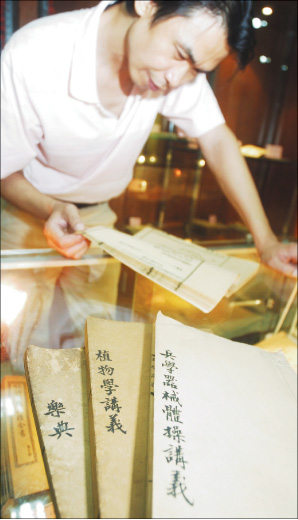Business
Hefty prices turn heads at antique book auctions
(China Daily)
Updated: 2010-08-24 14:59
 |
Large Medium Small |
|
 A visitor examines antique books at a book show in Hangzhou, Zhejiang province. A growing number of wealthy Chinese move into the antique book market as collectors and investors. Xu Yan / For China Dail |
BEIJING - Liu Yu's home in Beijing has a fire extinguisher in every room - simply to protect his book collection.
But the books the real estate developer is looking after is worth millions because most of them are antiques.
Among them are some vary rare books such as thread-bound books from Qing Dynasty (1644-1911), books and posters of the "cultural revolution" (1966-76) and two antique Shorter Oxford English Dictionaries on historical principles.
Liu, who has been collecting books for more than a decade, said the antique book market has been doing very well.
"The price of several sets of my books is growing. I will continue to seek and buy books for my collection," said Liu, general manager of Beijing Jinhangdao Real Estate Development Co Ltd.
"I have collected many books with a small number of one-time editions. And all my books are well protected and preserved."
Liu is one of a growing number of wealthy Chinese who are moving into the antique book market as collectors and investors as prices keep going up, especially at auctions.
Just in June, the Zizhi Tongjian Gangmu, a collection of political works from the Song Dynasty (960-1279) printed in 1600, was sold for 1.95 million yuan ($287,000) at an auction conducted by Beijing Debao Auction Co Ltd. The auctioneers thought the book would sell for 1.2 million yuan.
Two years ago, Linchuan Xianshengji, written in the 11th century by then prime minister Wang Anshi, was sold for 308,000 yuan by Beijing Debao. Several years before that, it was traded at 45,000 yuan at another auction, conducted by Cathay Bookshop.
Zhou Jianfeng, marketing manager of Beijing Nagel International Auction Co Ltd, said due to an increasing demand over the past year, auction prices in general for antique books have risen by as much as 30 percent.
"Wealthy collectors and super-rich businesspeople are two main consumer groups who are collecting high-valued ancient books," he said.
"The quantity of books, quality of pages, historical setting, contents and authors' reputation are all key points of evaluating the prices.
"The market is booming. We sold a number of costly books at our spring auction this year and we are looking forward to a bigger autumn auction next month."
And this is despite the fact that antique Chinese books are not allowed by the government to be sold, transferred, leased or pledged to foreigners.
In comparison with other types of antiques, conventional printing technique, ancient paper, cultural and historical significance and a few speculators have pushed investors to select antique books.
Books printed in the Ming and Qing dynasties (1368-1911) are the most sought after.
Feng Zhiguo, the owner of Qingyanxuan antiquarian shop, said antique books are good investments because they have a great potential to appreciate and "are extremely hard to forge".
"It requires archaic paper, traditional Chinese-style stencils, outmoded binding tools and plenty of money to produce counterfeits," Feng said.
"Books before Emperor Tongzhi, who reigned from 1862 to 1874 in the Qing Dynasty, were processed by woodblock, a movable type of printing process, which demanded many block printers to participate.
"Prices of typographic books are more valuable and expensive than the books after this emperor's rule due to the appliance of new printing technique."
Feng said many antique books were burned during the "cultural revolution".
In 2008, antique books fetched more than 150 million yuan at auctions, with an 81-page book Nanyuegao from the Song Dynasty selling for 4.4 million yuan.
Anthony Bliss, curator of the Bancroft Library, University of California, Berkeley, said a collection of antique material provides personal pleasure, including pride of ownership, but things that may be national treasures must be handled with the greatest care and respect.
"Anyone making decisions on restoration must be familiar with the physical nature of the material, its strengths and vulnerabilities, and its intellectual importance," Bliss told China Daily in an email.
Cui Yunquan, from Volumes Publishing Company, a publishing company in Shenyang, in China's northeast, said investors are also interested in books published before the 1980s.
"Some modern books can also be sold with a high price tag. For example, a 1945 edition of Selected Works of Mao Zedong is now worth more than 40,000 yuan," he said.
China Daily